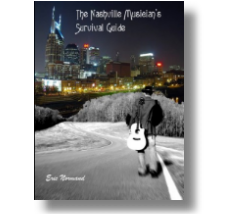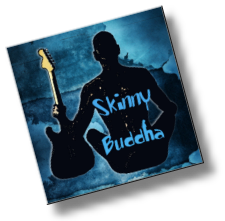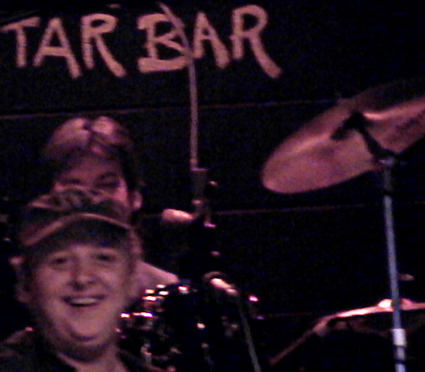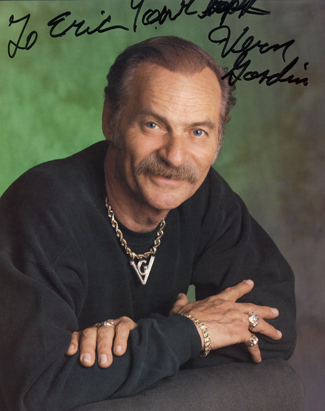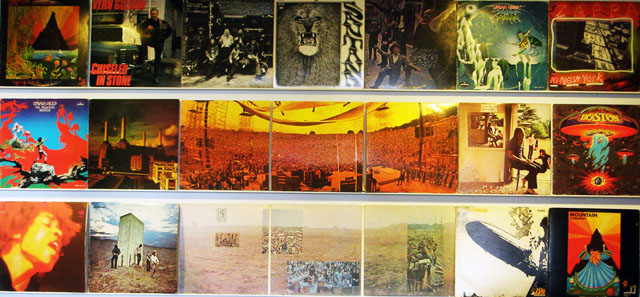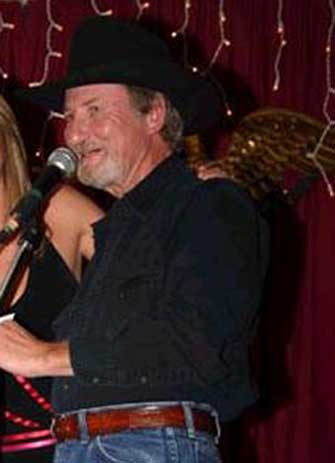
Ask any musician or songwriter that’s been in Nashville for a while if they’ve ever heard of, or been to the Fiddle and Steel and most will  say yes, for sure. The Fiddle and Steel Guitar Bar, aptly dubbed “The Steel”, is located in historic Printer’s Alley off of Church Street and has been a staple of the Nashville nightclub scene since 1996. This homey, rustic club, often referred to as “the cheers” bar of Music City, is a place where musicians, artists, tourists, and locals gather to enjoy great music, see old friends, and make new ones. The Steel has also been a launching pad for some of the biggest artists in country music today, including Rascal Flatts, Eric Church, and many others.
say yes, for sure. The Fiddle and Steel Guitar Bar, aptly dubbed “The Steel”, is located in historic Printer’s Alley off of Church Street and has been a staple of the Nashville nightclub scene since 1996. This homey, rustic club, often referred to as “the cheers” bar of Music City, is a place where musicians, artists, tourists, and locals gather to enjoy great music, see old friends, and make new ones. The Steel has also been a launching pad for some of the biggest artists in country music today, including Rascal Flatts, Eric Church, and many others.
To many musicians working within the Nashville music industry, the Steel is a special place, kind of a home away from home. The club’s owner, Alison Bradsher, takes great pride in creating a vibe that is comfortable and relevant to music industry types, while still appealing to locals and tourists. The club has a decent PA system and one of the best sounding stages in the city, making it a desirable room in which to perform. In line with the clubs friendly nature, guest musicians and singers sit in regularly with the house bands, a tradition that dates back to the clubs earliest years.
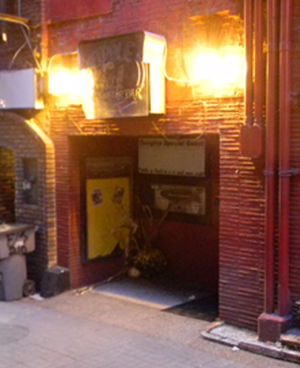 Over the years, many Nashville players and artists have established friendships and relationships at the Steel that have helped their careers, often leading to other gigs, touring and recording work, kind of a “gateway club” for some. So it’s no wonder that a couple of visits to the Steel by my wife and I during our “Nashville field trip” in 2002 helped prompt us to move here in the first place.
Over the years, many Nashville players and artists have established friendships and relationships at the Steel that have helped their careers, often leading to other gigs, touring and recording work, kind of a “gateway club” for some. So it’s no wonder that a couple of visits to the Steel by my wife and I during our “Nashville field trip” in 2002 helped prompt us to move here in the first place.
During my first year in Nashville we were pretty steady regulars at the Steel, hardly missing any of the Tuesday night jams hosted by Ronnie Pittman, and frequenting the club as often as we could. By September of that year I was gigging regularly with Ronnie on Mondays at the Second Fiddle on Broadway while playing in Kentucky on the weekends, and it was during this time that I first met Frank Taylor, a talented singer and songwriter who frequented the Steel quite a bit back then. A deep-rooted part of the club’s fabric, Frank was one of the very first singers to ever perform at the Steel, and whenever he was around; his presence only seemed to further enhance the charm of the place.
So when he asked me if I would be interested in playing guitar for him at his regular Saturday night gig there, of course I said yes. He’s a great singer and audiences related to him, the club was a great hang, and I was ready to take the next step in my Nashville evolution – pretty much a 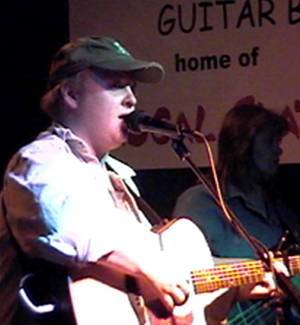 no-brainer. So I gave notice to my house gig in Kentucky and started playing every Saturday night at the Steel.
no-brainer. So I gave notice to my house gig in Kentucky and started playing every Saturday night at the Steel.
I’m not sure how this lineup came to be, but our band consisted of Frank on lead vocals and acoustic, Jack Gavin on drums, Brenda Clarke on bass and vocals, Steve Poole on keys, and me on electric guitar and vocals. It was a great lineup, we gelled well. Every Saturday night I would park in a nearby parking garage and wheel my gear down the old cobblestone street of Printers Alley, past the Bourbon Street Blues and Boogie Bar, and into the Steel. Every gig was an adventure, you never knew who might show up or what we might attempt, so I was genuinely excited to 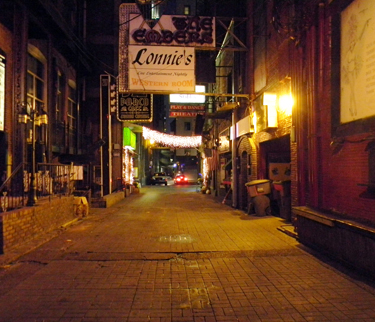 play.
play.
Frank isn’t the typical country singer; he has a unique angelic quality to his voice – soothing, soulful, yet compelling and almost hypnotic. He sang songs by artists like Vince Gill, Delbert McClinton, the Eagles, Jimmy Buffett, CCR, all of course with his own spin. He could make you laugh too. At least once a night he would say something like “Kelly’s coming around with the tip jar, and this is how we make our living in Nashville. If you could just spare a few dollars, I’ll be able to pick up some Krystal burgers for my daughter on the way home. Please throw in some money so I can feed her, she hasn’t eaten all day.” This was especially funny to anyone who knew Frank, as he didn’t even have a daughter.
Frank genuinely enjoyed singing and entertaining and this feeling was infectious, usually spilling over into the other players, the crowd, and the staff. After playing a good long hour or so for our first set we would take a break, and then, during the second set, we would get up any players and singers that wanted to sit in. The guests could range from some young aspiring singer on vacation from out of town, to touring musicians on hiatus, to artists like Joe Nichols or Toby Keith. Even the occasional tourist who wanted to sing Margaritaville was welcome on our stage (although most of the tourists had no business performing anywhere other than in a karaoke setting).
So that’s how I spent my Saturday nights for quite a while. We never had a rehearsal and didn’t really hang out together outside of these 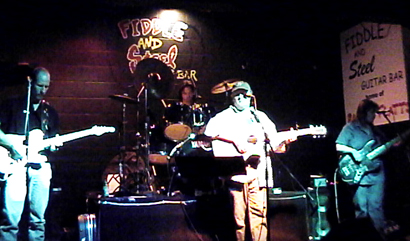 gigs, but we were a unit. By the time a couple of months had passed, this band was tight! Sometimes one of us would have to sub out our gig for something more lucrative, and eventually a couple of the other players moved on, but for a while, this lineup held together. And while I wasn’t making a lot of money, I was having tons of fun, gaining experience, and making contacts. By the middle of the summer of 2003 I was offered a road gig that I couldn’t turn down, and had to give Frank my notice. Ironically, the road gig came about through a friendship I had made at the Steel.
gigs, but we were a unit. By the time a couple of months had passed, this band was tight! Sometimes one of us would have to sub out our gig for something more lucrative, and eventually a couple of the other players moved on, but for a while, this lineup held together. And while I wasn’t making a lot of money, I was having tons of fun, gaining experience, and making contacts. By the middle of the summer of 2003 I was offered a road gig that I couldn’t turn down, and had to give Frank my notice. Ironically, the road gig came about through a friendship I had made at the Steel.
Looking back, those seven or eight months I spent at the Steel with Frank and the gang were among some of the best times I’ve had in Nashville. We may have all been on our own separate paths, searching for the next big gig, publishing deal, or connection, but once a week our paths crossed and we came together to play music and forget about our life struggles. Time stood still at the Steel on those nights and it seemed like those moments would last forever. Since those days, everyone that was in that band has moved on to different gigs. Isn’t it funny how life’s circumstances bring people together for a common purpose only to eventually spread us apart again like ash strewn to the wind. Even though I haven’t seen or spoken to some of my comrades at the Steel since those days, I’ll always have great memories of those times. For me, that’s what a great night club experience, or life for that matter, is all about – sharing good music and fun times with good friends, even if only for a brief moment. Thanks Frankie!
Having grown up in the Northeast on a diet of rock and blues, and listening to very little country music prior to moving to Nashville, the name Vern Gosdin was not one I was familiar with. So when I got a late-night phone call in the fall of 2002 about playing a show with him, my initial reaction may have been somewhat muted. The call came from a producer named Kenny whom I had met a few weeks earlier at my house gig at Libby’s. He described the show as being a one-off with Vern to somewhere in Kentucky and asked me if I could put together and rehearse a band. Hungry for work, I accepted the show and began making calls to recruit players the next day.
One of the first calls I made was to D for some advice. “Vern Gosdin! Do you realize who he is?” he replied in amazement. “Well I know he had some success a few years back.” I replied unknowingly. “They call him ‘the voice’ of country. It’s like getting a gig with Merle Haggard. I’ve been here 10 years and I’ve never got to play with him.” a hint of jealousy riddled his voice. “He’s a real legend. This will be a great experience for you.”
D’s excited reaction prompted a little further investigation, which of course revealed that ole Vern was sure enough a bona fide superstar. 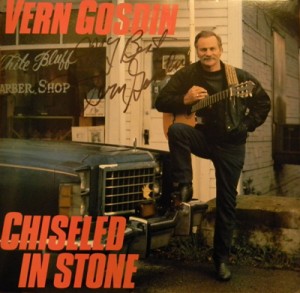 In a career that spanned over four decades, he had recorded somewhere around 20 albums yielding roughly the same number of top 10 hits. Now I began to get a little nervous. Always up for a good challenge, I began calling some of the better players I had met over the past couple of months. The role of a bandleader in Nashville, I quickly learned, puts one in the unique position of being able to offer work to other players, and in Nashville, work is something there is never enough of. Once people know you’re a bandleader, phone calls start getting returned with more expediency and other musicians seem to have more interest in you when you walk into a room (of course when things go wrong, you will be the first one everyone looks to).
In a career that spanned over four decades, he had recorded somewhere around 20 albums yielding roughly the same number of top 10 hits. Now I began to get a little nervous. Always up for a good challenge, I began calling some of the better players I had met over the past couple of months. The role of a bandleader in Nashville, I quickly learned, puts one in the unique position of being able to offer work to other players, and in Nashville, work is something there is never enough of. Once people know you’re a bandleader, phone calls start getting returned with more expediency and other musicians seem to have more interest in you when you walk into a room (of course when things go wrong, you will be the first one everyone looks to).
Within a few days I had put together a five piece band of the best players I could find consisting of Chip on drums, Sid on bass, Mark on keys, Brian on steel, and me on guitar. I obtained recordings of Vern’s material from his assistant, charted the songs, and dispersed these materials to the other players. As the show date grew closer, Vern’s assistant notified me that one rehearsal would be required the week of the show. I also learned that we would need to provide transportation for Vern to and from the rehearsal, as he no longer drove.
On the day of the rehearsal, a couple of the band guys that lived close to Vern’s home near Opryland stopped by to pick him up. My only encounter with Vern up to this point had been one brief phone call, and our discussion was so brief that I still had yet to gain a real sense of the man. Over the weeks leading up to this rehearsal I had begun hearing a few horror stories about Vern. Apparently, he had a penchant for firing drummers, at least according to the rumors, and had a reputation of being quite “ornery” from time to time. He had even been known to pull a gun on a few unsuspecting musicians over the years, supposedly.
This was not the Vern that I would meet later on that night. For into my house walked one of the kindest, sweetest fellows you could ever meet. He had a sense of humor too, as we all learned when I was the butt of his first joke on this night. “How are you feeling today?” he asked. “Great, thanks.” I replied. “Well it’s a good thing that you don’t feel like you look.” he responded as muted chuckles engulfed the room. This kind of dry humor was apparently typical for Vern as I would later learn.
I had rearranged my basement music room to accommodate this band rehearsal, and the limited space was quickly filled with gear and bodies. Once the gear was up and running, our rehearsal began. Another thing that I would later learn was that Vern had suffered a stroke in recent years, and this often impeded his communicative ability. Several songs were stopped short when he needed to convey different musical ideas – signature licks, key changes, intros, endings – he couldn’t always communicate exactly what he was thinking, but it became obvious that he knew his music well, and that he knew when something wasn’t being played right.
We did our best to make his songs feel right to him, and although the mood of this night was fairly upbeat, the rehearsal wound up being shorter than optimum for us, and longer than optimum for Vern. He was getting tired and called the night before we could get through all of the material, rendering it essential that the band be extra prepared for the gig.
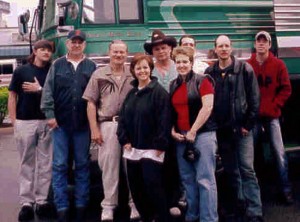 A few days later we all met at Fiddlers Inn near Opryland and hopped on a bus bound for a show in Kentucky. We rode the bus for a few hours before arriving at our gig where we loaded in, sound checked, and ran a few tunes. We did two shows that night in a midsized venue that was reminiscent of an old church out of yesteryear. The two sets were night and day by comparison, the first being quite bad as Vern was feeling a bit under the weather. We did our best to hold it together behind him, but it was a struggle. After a long break, during which Vern got some food and rest, we hit the stage again for our second and final show. Vern, now feeling much better, performed brilliantly. His sweet, resonant voice conveying a wide spectrum of emotions, I could now hear why he had been deemed “the voice” by so many. This strong vocal performance made it effortless for the band to follow him – We were on! The show ended to a strong applause and a room full of smiles. We had done what we had set out to do, and were on our way home.
A few days later we all met at Fiddlers Inn near Opryland and hopped on a bus bound for a show in Kentucky. We rode the bus for a few hours before arriving at our gig where we loaded in, sound checked, and ran a few tunes. We did two shows that night in a midsized venue that was reminiscent of an old church out of yesteryear. The two sets were night and day by comparison, the first being quite bad as Vern was feeling a bit under the weather. We did our best to hold it together behind him, but it was a struggle. After a long break, during which Vern got some food and rest, we hit the stage again for our second and final show. Vern, now feeling much better, performed brilliantly. His sweet, resonant voice conveying a wide spectrum of emotions, I could now hear why he had been deemed “the voice” by so many. This strong vocal performance made it effortless for the band to follow him – We were on! The show ended to a strong applause and a room full of smiles. We had done what we had set out to do, and were on our way home.
Over the next year I played a handful of dates with Vern, and remained as bandleader and guitarist through my tenure with him. About a year later I started working on a busy tour and could no longer do Vern’s dates. But during that time we had become good friends, and years later he still called me from time to time to say hi. He had a handful of jokes that weren’t particularly funny, that somehow made me laugh anyway. I would be walking around a supermarket or Wal-Mart and the phone would ring – “Hey son, it’s Vern, I’ve got to ask you something. Do you hear that sound?” “What is it?” I would ask. “It’s the sound of my boot hittin’ your ass!”
He would literally start out every conversation with a joke like this, and I would laugh every single time. Around 2008 I was fortunate enough to have a schedule that would allow me to do a few more shows with him. Then I heard the sad news in April of 2009 that he had died from complications due to another stroke. “The Voice” of country may have moved on, but his musical legacy remains a timeless testament to his greatness. And the Vern that I grew to know and love will always hold a special place in my heart. Even though I know he won’t be calling any time soon, I still keep his number in my cell phone, just in case.
Just for fun, I thought I would make a list of what I consider the top 25 greatest rock albums of all time. Growing up in the 70s and 80s, this music was the backdrop of my life, and I listened to most of it on vinyl, the medium in which I still prefer most today. In fact, I still own most of these albums and listen to many of them regularly. First of all, this was a hard list to compile. I have so many favorites and it was hard to whittle it down to just 25. What makes a great album? I think it comes down to the songs, performances, production, staying power, and popularity. Of course, excluding popularity, all of these criteria are a matter of opinion.
The following albums, in my mind, are all gems. They are all outstanding collections of great songs performed by brilliant musicians, and deliver a monumental sonic imprint to the universe. You might notice, barring a few exceptions, that most of this music was recorded before 1980. Once again, just my opinion, but I think that the majority of all great rock music was recorded during the 60s and 70s. Although some great rock records were made during the 80s, advances in recording techniques led to the tendency to “overproduce” which unfortunately dated many recordings from that period. By the 90s, the rock ‘n roll party was pretty much over. While grunge and alternative did have some elements of rock, the feel-good factor (along with guitar solos) seemed to be missing.
So here it is. The music that rocked the masses, the songs that inspired so many of us to grow, the sounds that made me want to learn guitar, the records I cranked full blast on my bedroom stereo after school before the parents got home, the music I listened to in my car while cruising the beach with my buddies late at night, the songs that helped solve many of life’s problems, the music of my generation and the generation just before – The greatest albums by the greatest bands from the golden era of rock!
|
1. |
Boston – Boston |
|
2. |
Van Halen – Van Halen |
|
3. |
Are You Experienced – Jimi Hendrix |
|
4. |
Led Zeppelin IV (Zoso) – Led Zeppelin |
|
5. |
Dark Side of the Moon – Pink Floyd |
|
6. |
Electricladyland – Jimi Hendrix |
|
7. |
At Fillmore East – Allman Brothers |
|
8. |
Led Zeppelin I – Led Zeppelin |
|
9. |
Van Halen – Fair Warning |
|
10. |
Montrose – Montrose (Sammy Hagar’s first band circa 1972) |
|
11. |
Bad Company – Bad Company |
|
12. |
Abraxas – Santana |
|
13. |
Rubber Soul – The Beatles |
|
14. |
Band of Gypsies – Jimi Hendrix |
|
15. |
Moving Pictures – Rush |
|
16. |
Revolver – The Beatles |
|
17. |
Whitesnake – Whitesnake |
|
18. |
Back in Black – ACDC |
|
19. |
Wheels of Fire – Cream |
|
20. |
Doctor Feelgood – Motley Crue |
|
21. |
Machine Head – Deep Purple |
|
22. |
Woodstock Soundtrack |
|
23. |
Get Your Wings – Aerosmith |
|
24. |
Van Halen II – Van Halen |
|
25. |
Who’s Next – The Who |
What’s your take? Do you think all of these albums belong at the top of the pile? Do you think any are missing? What are your favorites? I’d love to hear your thoughts and comments.
It was sometime in the fall of 2002 and my wife, Kelly and I were attending our weekly Tuesday night outing at the Fiddle and Steel. Already having sat-in earlier in the night, we were getting ready to leave as it was getting kind of late, when Ronnie Pittman, the singer and host of this unofficial jam night, approached us at the bar. “Hey man, I need a guitar player to play some Monday nights with me at the Second Fiddle. Are you interested?” he asked. “I’d love to, thanks for asking.” I replied, further adding “One thing I should tell you upfront is that I’m not totally up on all the old country stuff yet.” “That’s no problem; we don’t do that many old country tunes. And besides, the last thing I need is another guitar player that constantly plays ‘dubadibby dabaduboo dubadibby dabaduboo’.” he explained, mimicking a cliché sounding rapid-fire guitar lick. “Great, I’m there!” I exclaimed.
The following Monday I arrived early to the Second Fiddle on Broadway, double parked to load in my gear, and then drove around for 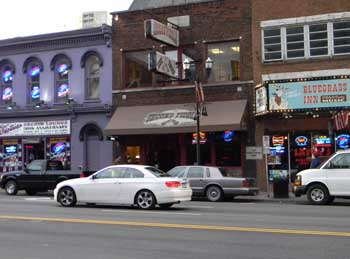 about 20 minutes looking for a free parking space. After setting up my stuff and hanging for a bit with Ronnie and the band, our night of music began. Ronnie played a mix of contemporary country ranging from Travis Tritt to Little Texas, some 80s and 90s country/pop from groups like Exile, a few old school country tunes, R&B from the likes of Delbert McClinton and Van Morrison, and some classic rock from groups like the Eagles, the Allman Brothers, and Steve Miller. His wife also sang harmony and lead vocals and fronted the band on a few songs by artists like Martina McBride and the Dixie Chicks.
about 20 minutes looking for a free parking space. After setting up my stuff and hanging for a bit with Ronnie and the band, our night of music began. Ronnie played a mix of contemporary country ranging from Travis Tritt to Little Texas, some 80s and 90s country/pop from groups like Exile, a few old school country tunes, R&B from the likes of Delbert McClinton and Van Morrison, and some classic rock from groups like the Eagles, the Allman Brothers, and Steve Miller. His wife also sang harmony and lead vocals and fronted the band on a few songs by artists like Martina McBride and the Dixie Chicks.
I knew a lot of the material and managed to feel my way through the songs I didn’t know. We played a couple of long sets with a break in the middle and, although people wandered in and out of the club all night, I don’t think the crowd ever got above 15 or 20. Nevertheless, the music was enjoyable and we all had a good time playing. At the end of the night I tore down my gear and waited for Ronnie to count the tips (I think the grand total was something like $28 apiece including the base pay of $20 each). The short pay was all right with me, as I was still trying to gain experience and make connections. Ronnie thanked me and asked me if I wanted to play the following Monday, which of course I did, and told him so.
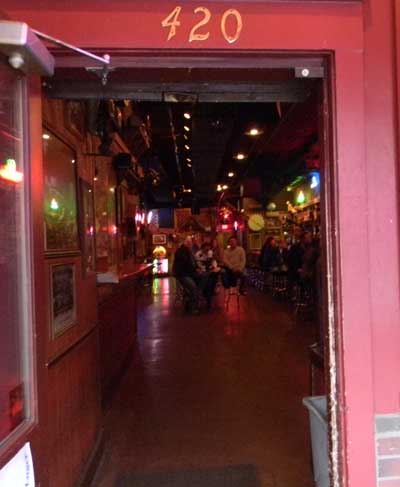 So this became my first regular in town gig. And it was perfect. Ronnie was a real laid-back singer to work for, he always had a decent rhythm section, and his repertoire consisted of a lot of pop, rock, and R&B; styles I was already familiar with. He did play just enough contemporary and classic country for me to explore my new chops in that area as well.
So this became my first regular in town gig. And it was perfect. Ronnie was a real laid-back singer to work for, he always had a decent rhythm section, and his repertoire consisted of a lot of pop, rock, and R&B; styles I was already familiar with. He did play just enough contemporary and classic country for me to explore my new chops in that area as well.
Gigging with Ronnie also created some other opportunities. After a month or so of these gigs I did an out of town weekend with Ronnie and his band in Georgia. It was on that gig where I met a keyboard player Ronnie had hired named Gordon, and it was through Gordon that I landed the house gig at Libby’s in Kentucky.
Another connection I made was through one of our regular attendees, a truck driver named ‘Bud’ who worked for Charlie Daniels and took a liking to my guitar playing. He stopped in for our gig once in a while when he was in town, eventually hooking me up with a friend of his who had an indie band called “The Watercolor Project”. I wound up doing some recording sessions with this trippy rock band, a project and genre that allowed me to gain some studio experience in a far more relaxed setting than my virgin studio outing , a debacle that almost sent me packing a couple of months prior.
So I was getting my country/pop thing happening by gigging with Ronnie on Monday nights, and honing my chops on traditional country on the weekends in Kentucky. While it was a lot of activity it still didn’t add up to enough to pay the bills, so I was still working the eBay/pawn shop angle pretty hard. One of my eBay sales, that of an old Tube Screamer that I sold for $75, was bought by another Nashville guitarist who suggested meeting in town to buy the pedal rather than shipping it. I e-mailed him about meeting at my Monday night gig, and the following week he arrived to do the transaction. This led to one of the biggest eye openers I had in that first year.
I arrived downtown for my regular Monday night gig with Ronnie and set up my gear. After the first set I was still standing on the stage for a few minutes when a long-haired fellow approached me. “Are you Eric?” he asked. “Yes.” I answered “You must be Mark.” After exchanging a few brief words I presented him with one slightly beat up Ibanez Tube Screamer and he paid me $75 in cash. He then asked 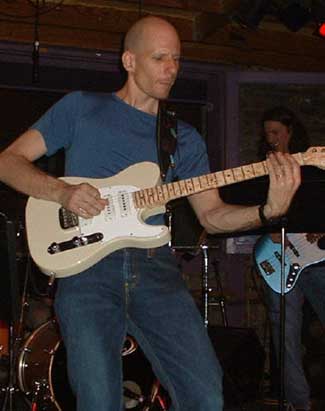 me how long I had been in town, to which I answered “I’ve been here for about six months.” He reacted with surprise, acknowledging my accomplishments with “Wow, that’s great. Six months and you’re already gigging.” He then added “I’m still working towards playing out, I’m not quite there yet, but I’m getting close. I’ve been in a couple of different bands so far, but nothing that’s made it out of the practice hall yet.” “How long have you been here?” I asked innocently. “Five years.” He answered and a deafening silence engulfed the moment.
me how long I had been in town, to which I answered “I’ve been here for about six months.” He reacted with surprise, acknowledging my accomplishments with “Wow, that’s great. Six months and you’re already gigging.” He then added “I’m still working towards playing out, I’m not quite there yet, but I’m getting close. I’ve been in a couple of different bands so far, but nothing that’s made it out of the practice hall yet.” “How long have you been here?” I asked innocently. “Five years.” He answered and a deafening silence engulfed the moment.
The stark reality that there are musicians trying to find their way in Nashville that are here for years had yet to stare me in the face with such clarity. It was almost as if an atomic bomb had been dropped right outside of the club. “I’m sorry to hear that, best of luck to you with that.” I mean, what else can you really say? A minute or so later we said goodbye, and the long-haired struggling stranger sauntered out the door.
For me, that moment clarified a lot of things. It made me realize that there are far more musicians here than there are opportunities for them. It reaffirmed some of the advice I had received from my mentor, D, one piece being “Whatever you do, don’t join a band, band’s starve.” It made me further appreciate the fact that I was lucky enough to have a mentor here in the first place. It allowed me to view all of my gigs and performance opportunities with much more optimism. And it made me realize, in a town where so many struggle, just how fortunate I had been so far.
It was the fall of 2002, I’d been in Nashville for a few months, and had just landed a weekend house gig at Libby’s Steakhouse in Kentucky, a great country music venue in which I could hone my chops. I was spending most of my days selling stuff on eBay, driving around to pawn shops looking for more stuff to sell on eBay, and practicing, practicing, practicing. My recent debacles on Broadway and at a recording studio on Music Row revealed to me that I had a lot of work to do, and this prompted me to get really organized about my practice regimen. While I was still going to downtown Nashville one or two nights a week to network, making the Tuesday night jam at the Fiddle and Steel a regular stop, these weekly outings on the town mainly served to build connections, not so much to sit-in. I needed to improve my country chops quite a bit before I would be comfortable enough to put myself out there on the chopping block again.
So every Friday around dinnertime I would set out for Daysville, Kentucky, sometimes accompanied by my wife, sometimes not. Each weekend outing at Libby’s would introduce me to new material, and I would obtain recordings of these songs to work on over the following week. In addition to learning these songs and other standards I heard around town, I was digging in hard to my technique in general, practicing country rhythm, chicken pickin’, Western swing and, to avoid losing any ground, a little rock, blues, and jazz as well. A friend of mine had given me a CD of some old-school country tele players, Bill Kirchen and Redd Volkaert aka the Twang Bangers, and I listened to and tried to mimic their lines, style, and feel. I also did the same with recordings of Alan Jackson that featured Brent Mason.
To create a challenging way to practice all these new techniques, I burned a mix CD comprised of several country, western swing, and bluegrass tunes. The 11 song guitar workout CD covered nine different keys, a variety of tempos, and several different feels (straight eighths, swing, etc).
|
Key |
Song |
Tempo/Feel |
|
D |
Goodhearted Woman |
slow eighths |
|
E |
Folsom Prison Blues |
medium eighths |
|
F |
Truck Drivin’ Man |
fast eighths |
|
Bb |
Chase Each Other Round the Room |
medium swing |
|
G |
How Mountain Girls Can Love |
fast eighths |
|
Ab |
Workingman Blues |
medium eighths |
|
A |
Poultry in Motion |
medium eighths |
|
G |
She Loves Anything |
fast eighths |
|
Bb |
White Lightning |
medium eighths |
|
B |
I Don’t Think Hank Done It This Way |
medium eighths (Waylon Stomp) |
|
F |
Quit Feelin’ Sorry |
medium swing |
Prior to moving to Nashville, I had never used the chicken pickin’ technique, and as it was the weakest link in my chain, it was the technique I practiced the most. This technique is a hybrid way of picking the strings on a guitar. Holding the pic between your thumb and first finger,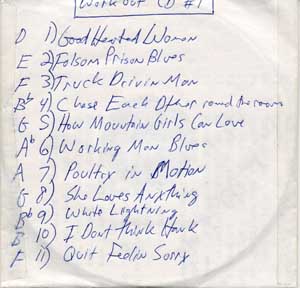 you alternate between picking the strings with the pic, and plucking the strings with either the third finger or second and third finger. This is also commonly referred to as “the claw”. Both rhythm and lead lines can be played with this technique, and practicing along with this CD, without pausing in between songs, somewhat emulated the pace and variations that might happen while performing with a live band.
you alternate between picking the strings with the pic, and plucking the strings with either the third finger or second and third finger. This is also commonly referred to as “the claw”. Both rhythm and lead lines can be played with this technique, and practicing along with this CD, without pausing in between songs, somewhat emulated the pace and variations that might happen while performing with a live band.
Every day I worked diligently in my basement music room, practicing country music standards and technique. I would practice until my right hand felt like it was falling off, or until I felt like throwing my guitar through the window, always managing to stop just prior to either thing happening. My improvement was slow, but steady, and gradually the other players at my weekend gig began to notice. I would practice and do the eBay thing all week long, go downtown to network for a couple of evenings, and head off to Kentucky for the weekends.
Libby’s was a family kind of place with a relaxed atmosphere and served no alcohol. But this didn’t stop some of the band members, me occasionally included, from sneaking a beer or two out back before the shows and during breaks. Hey, we were playing country music at a steakhouse in Kentucky; I don’t think Merle or Hank would disapprove. In all fairness to Libby, who was trying to run this show as professionally as he could, everyone seemed to keep the Budweiser buzz to a dull roar, always making a strong performance the priority (okay, maybe a few times the steel player got a little too loopy and hacked a little). But Budweiser or not, we had a great time. The players and the guest singers always gave it their all, and the crowd, no matter how big or small, always showed appreciation.
I worked at Libby’s for about four or five months through that fall and winter and, in hindsight, it was the best thing that could have happened to me at that point in time. By early spring I felt ready to dig in full bore to the country scene in Nashville and gave my notice. Libby understood why I had to leave, thanked me for my time, and wished me luck.
A couple of years later I was gigging at Tootsies and ran into one of the girls who had been a regular guest singer at Libby’s. Sadly, she informed me that Libby had just passed away at the age of 65. We reminisced about what a great time we always had back in the day, and how much he had cared about music and people. Libby was a sweet old guy and had treated me with the utmost respect. He gave me a chance when I needed it. I will always look back on those days with fondness, and will be forever grateful to have known Libby Knight.
D – Goodhearted Woman slow eighths
E – Folsom Prison Blues medium eighths
F – Truck Drivin’ Man fast eighths
Bb – Chase Each Other Round the Room medium swing
G – How Mountain Girls Can Love fast eighths
Ab – Workingman Blues medium eighths
A – Poultry in Motion medium eighths
G – She Loves Anything fast eighths
Bb – White Lightning medium eighths
B – I Don’t Think Hank Done It This Way medium eighths (Waylon Stomp)
F – Quit Feelin’ Sorry medium swing
As my first summer in Nashville was drawing to a close, I was basically jobless, running out of savings, and fast realizing that I had a long way to go to become proficient at playing country music, a style that was quite new to me. For many newcomers to Nashville, sitting in, gigging, and networking around town can make you feel like you are under a microscope, as was also the case for me. I had converted the basement of my rented home in Gallatin into a studio where my daily ritual consisted of learning country standards and practicing my chicken pickin’ technique (I was also conducting an eBay campaign and gradually selling off everything I could stand parting with). But all this practicing alone wasn’t enough. I needed some practical live experience but, after my recent debacle on Broadway, needed to accomplish this outside of the microscope for a bit. So when I got a phone call from Gordon, a keyboard player I had recently met, about playing in a house band for a country music talent show in Kentucky, I jumped at the offer.
Libby Knight, owner of Libby’s Steakhouse in Daysville, Kentucky, had been a longtime supporter of country music, hosting his talent show “Live at Libby’s” since 1984. During the show’s heyday there was a live radio broadcast, and it was from this venue that many singers like Garth Brooks, Tracy Lawrence, JoDee Messina, Trisha Yearwood, and others once performed in obscurity, some, arguably getting their start there (it is rumored that at one time record deals for some artists began to take shape in the front lobby). The boom days of this once would-be Opry style country music house now long gone, this was the perfect low-pressure opportunity I needed to hone my country chops.
During my phone call with Gordon, he explained to me that the Friday night show was an audition night for singers. Libby would pick the best vocalists to come back and rehearse with the band Saturday afternoon from 1 to 4, after which the band would be provided a dinner followed by the Saturday night concert from 8 to 11. For our services, each band member would receive $100 total for both nights. While this was not the greatest pay, I didn’t mind as I greatly needed the experience. Not to mention that a hundred dollars was a lot more than I was earning on most weekends at this point in time, which was typically nothing. Of course my first weekend at Libby’s was an audition for me as well. I had already done a gig with Gordon and he liked my playing, but the band leader had yet to hear my playing and I would have to win him over to be offered a regular spot.
I left Gallatin late in the afternoon on a Friday to make the hour and a half drive north into Kentucky. The scenic drive was mesmerizing at times as I found my way through a maze of picturesque back roads laced with cornfields, cattle grazing across rolling pastures, and the occasional small town. I arrived to the rural community of Daysville and pulled into Libby’s, a long barnlike structure that sat adjacent to a large field and reeked of another era. After loading in my gear and meeting Libby and the other musicians, I went over to a long row of tables at which several of the players had gathered, organizing their charts. “We’ve got charts for pretty much everything we’ll be playing.” said Gordon “Here’s a set list that shows the order of the singers, and the songs they’ll be doing.” I grabbed my charts, put them in order, and got ready to play.
Libby was a colorful character, upbeat and generally excited about these events, and this enthusiasm was evident a little while later when the show began with his announcements. Well dressed in a white shirt, Wrangler jeans, cowboy boots, and 10 gallon hat, he spoke from side stage with a deep resonant voice infested with a thick southern drawl and introduced the show as if it were the Grand Ole’ Opry. He disappeared behind the curtain while the audience was still applauding and we were off and running. After the first two songs, which featured the house band, he returned to announce the first vocalist to audition. We began playing the intro to ‘Walkin’ After Midnight’ as he walked off and an attractive young lady dressed for success walked onto the stage and saddled up to the mic. The band, which was comprised of some great players, was instantly cookin’, the young lady sang well, and the song was well received. Libby returned to the stage to rally some more support from the crowd and announced the next singer.
The material we played throughout the night was a mix of classic and new country, and the Nashville style number charts were of immense help. Some of these songs I knew, many I had heard but never played, and some were completely foreign to my ears. For the songs that required a lead guitar intro that I didn’t know, the bass player helped me out by humming the phrase right before the count off. All in all, I played well, enjoyed playing with the other musicians and singers (maybe not all of the singers), and everyone seemed to like my playing. We played two long sets with this format which had a surprisingly smooth flow, largely due to Libby and the band leader’s organization, and the night came to an end.
I returned the next afternoon for the rehearsal and ran through tunes with the best singers chosen from the night before. Each singer was allotted two songs for Saturday night’s show, so we spent much of this time learning songs we hadn’t played the night before. The rehearsal was kind of long, but the atmosphere was relaxed. We broke for dinner, a feast which consisted of your choice of one of Libby’s famous steaks or fried catfish with sides of baked potato, hush puppies, coleslaw, and sweet tea – a Southern delight. Making the mistake of over-eating, or perhaps just underestimating the fat content of this meal, I felt a bit “heavy” after dinner so I attempted to walk some of it off in the parking lot before the show.
A little while later I was back at the “chart table” with the other players organizing my stack of charts for the night. At eight o’clock sharp we were off and running after another excited send-off from Libby. Similarly to the night before, everything went real smooth. Vocalist after vocalist took the stage – young ladies sporting big hairdo’s and dressed in evening gowns, men clad in jeans, plaid shirts and cowboy hats, a couple of teenage prodigy’s – even an elderly gentleman in his 60’s sang country classics giving it their all. The crowd was attentive and even sang and clapped along at times. Adding an element of showbiz to the night, Libby would walk out from behind the curtain every once in a while and raise his arms in the air to incite additional applause after modulations and solos.
Just as we did the night before, the band played great, and most of the singers were excellent. The afternoon rehearsal allowed the band and singers to become comfortable with the material and really dig in during the show. Nothing like the helter-skelter nature of the in-town Nashville club scene, this gig was relaxed and outside of the microscope, but still had a professional edge.
I left the gig in good spirits and made the long drive home. It would be a little while before I was asked to return as I was subbing and the other lead player had not yet made a permanent exit, but a few weeks later I was asked to become a permanent member of the house band. I had passed the audition and landed what turned out to be the perfect gig for me to hone my country chops. Live at Libby’s – country music basic training!
During the summer of 2002 I was aggressively exploring the live music scene of Nashville. Upon the recommendation of my friend, D, I was regularly making the rounds at clubs on Broadway, Printers Alley, and other spots around the city to better understand the scene, and to begin building the relationships I would need to succeed here. For the most part I was in kind of a watch and learn mode, often finding a table with my wife at the back of these clubs and just listening to the performers, sometimes even writing down the names of unfamiliar songs on napkins to learn later. Most of my musical background is rooted in rock, blues and jazz, so the repertoire played by most of these artists and bands, being mostly country, was largely foreign to me. Not to mention the art of country guitar playing, partly based on a technique called “chicken pickin”, was something I had yet to conquer.
I had already successfully sat in on a few occasions, carefully choosing situations that would allow me to showcase on songs and styles that were familiar to me, but for the most part I had avoided sitting in with bands that played mainly country. D had conveyed to me the importance of slowly building a great reputation – “Good news travels slow, but if you fart on stage they will immediately hear about it all over town.” So I was slowly and carefully building my reputation. But this cautious approach prevented me from sitting in on many occasions, fearful that I would get in over my head. D respected the fact that I was being cautious, but he also knew that I was beginning to become pigeonholed as a rock player as I never sat in on country tunes. So maybe that was part of the reason he invited me to a 6 to 10 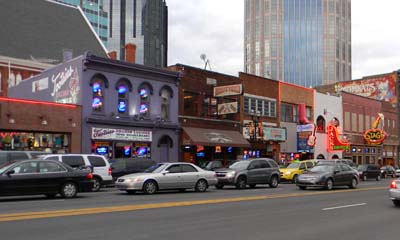 shift he was playing on a Saturday night in the front room of Tootsies.
shift he was playing on a Saturday night in the front room of Tootsies.
My wife, Kelly, and I arrived downtown around seven o’clock and found a parking spot. The summer air was hot and thick and people were out in abundance. We walked into Tootsies, which was packed to the gills, and found a spot to stand near the bar a few feet from the tiny stage. D spotted us and gave me a nod. He was playing with a stripped down Broadway unit of drums, bass, and guitar, fronted by an otherwise typical looking country singer sporting a cowboy hat, cowboy boots, denim shirt, and Wrangler jeans. The band was cranking out country standards in rapid succession, the tempos were fast, the music was loud, and the crowd was partying heavily. After an hour or so D looked over at me and said “Do you want to play a couple?” Feeling that I needed to rise to this occasion, I nodded yes and walked over to the stage.
As I hopped up on to the overcrowded stage he handed me his guitar and said “Just ask the bass player if you don’t know the changes, he’ll help you through.” I had just barely strapped on the guitar when the singer shouted out “OK boys, Rocky Top in G”, a country standard I 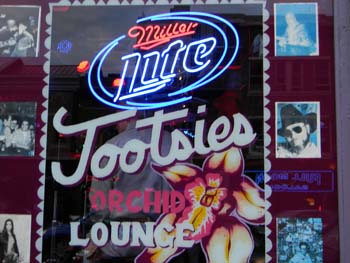 had heard on several occasions but had yet to play. It just so happened that the singer was playing an acoustic and, as the first verse is just acoustic and vocals, this gave me time to figure out the chord progression. So when the whole band came in after the first chorus, I was right there with them, sort of. While I did manage to improvise, or fumble, my way through the first solo without any glaring problems, apparently I was a little heavy handed on the rhythm of the next verse, probably due to years of playing in rock bands combined with almost no experience playing country. D motioned from his spot at the bar to hush my volume a little and I attempted to do so. I managed to get all the way to the end of the main part of the song, hanging on by a thread, before it began to get ugly.
had heard on several occasions but had yet to play. It just so happened that the singer was playing an acoustic and, as the first verse is just acoustic and vocals, this gave me time to figure out the chord progression. So when the whole band came in after the first chorus, I was right there with them, sort of. While I did manage to improvise, or fumble, my way through the first solo without any glaring problems, apparently I was a little heavy handed on the rhythm of the next verse, probably due to years of playing in rock bands combined with almost no experience playing country. D motioned from his spot at the bar to hush my volume a little and I attempted to do so. I managed to get all the way to the end of the main part of the song, hanging on by a thread, before it began to get ugly.
For those of you unfamiliar with this Broadway classic, the main body of the song is played with a half-time feel, the song modulates up a whole step, and then the song kicks into double time for a long-winded fiddle solo outro. So, being the only soloist in this situation, it was my job to mimic the fiddle solo, and I managed to do so quite poorly. While I had been practicing my chicken pickin’ technique daily for a couple of months by this point, this was probably my first practical application. I quickly learned that practicing this style with a metronome or CD at home, and improvising a would-be fiddle solo at warp 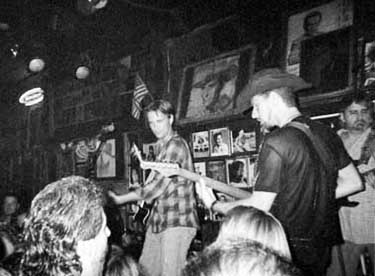 speed with a band in a nightclub are two different things. No matter what I heard in my head, my fingers just wouldn’t do it. I hacked, chopped, and butchered my way through two long choruses that seemed to drag on for eternity.
speed with a band in a nightclub are two different things. No matter what I heard in my head, my fingers just wouldn’t do it. I hacked, chopped, and butchered my way through two long choruses that seemed to drag on for eternity.
The song ended and the crowd of tourists cheered, completely oblivious to my train wreck. But I am certain that the other players on stage did hear every single ugly note I played. D certainly did as he quickly came to my rescue, snatching the guitar from my hands before I could do any more damage. “That one got away from you a little bit.” he kindly said as I left the stage. Feeling less than excited about hanging around after this awkward moment, we left after a couple more songs.
The next day D called me and we spoke about my debacle. “I think you should stay away from Broadway for a little while, at least until you get a little more familiar with the songs and the style. The guys I was playing with last night are cool and know you’re still learning, so there’s no harm done there. But you definitely don’t want to want to do anything like that again.”
I had already been playing guitar for over 20 years and could play rock and blues as good as most. But country music wasn’t yet in my vocabulary, and chicken pickin’ was as foreign to me as French Morocco. It was like learning how to play guitar all over again. That one train wreck made it apparent to me that I was going to have to practice for three to four hours a day for quite a while to learn this new language. So that’s just what I did. I obtained recordings of as many country standards as I could and burned mix CDs. I began dissecting the songs, writing number charts for them, learning arrangements, rhythms, solos, even bass lines. As chicken pickin’ is essential to traditional country guitar playing, I followed one piece of great advice from D “Put on a CD of old-school country and improvise solos over entire songs using the chicken pickin’ technique.” I forced myself to do this and, although I sometimes felt like throwing my guitar through the window, slowly began to see improvement. I was determined to never have another moment like my debacle on Broadway ever happen again. And while I did eventually get the hang of chicken pickin’, to this day, I still cringe every time I hear Rocky Top!
It was sometime late in the summer of 2002 and I had already been in Nashville for a couple of months when I got a phone call from my friend “D”. He had been hired by a producer at a recording studio on Music Row to lay down some lead guitar tracks on a couple of songs and, as he was trying to help me become established in the Nashville music community, thought this might be a good opportunity to break me into the world of professional recording. Apparently there were two songs that would be in need of lead guitar, one being an original by a Nashville writer, the other being a cover of the Bonnie Raitt song “Something to Talk About”. As I had some experience playing slide guitar, and he had some pull with the producer, he thought it would be a good idea for me to learn the slide parts and sit in on the track. Piece of cake, right? I had a couple of days to prepare, so I began wood shedding the song.
A couple of days later I met D at his house and we drove into town, arriving at a large, nondescript looking white building on Music Row. We carried our guitars in and walked down a long hallway past several recording studios, the activity inside them visible through large plexiglass windows. Whatever small amount of the jitters I was feeling in the parking lot was now replaced with intimidation and a growing amount of “freakedoutedness” as we entered a large control room with several gold records on the wall. D introduced me to Greg (the engineer/producer) telling him “My friend Eric here is a decent slide player and I brought him along to play on the Bonnie Raitt song.” “Sounds good.” he replied. He then introduced me to Donnie, the only other person present in the studio, telling me that he was a great song writer and that I had probably heard some of his songs on the radio over the years. I was also informed that he had written one of the songs we were working on today and both songs were demos for a female artist he was working with. Can we add a little more pressure here please?
Greg led us into a large live room adjacent to the control room which was visible through a large Plexiglas window and pointed to an old Fender amp stating “After you tune up you can play through that.” After tuning my old Strat I plugged in and grabbed a pair of nearby headphones. By now Gregg and D had returned to the control room and I could hear Greg’s voice coming through the headphones “Play a little so I can get a level on you.” I started playing some slide licks and quickly realized the amp had little to no sustain. “Okay, I’ve got a level. Are you ready to make a pass?” “Okay” I sheepishly replied, and with that the count off to the song began. All the tracks to the tune had been previously laid down except for the lead guitar and I began playing the opening riffs at four bars in, just like the record. Or so I thought. The audio in my headphones seemed to stop almost as quickly as it had started, interrupted by the sound of Greg’s voice “It sounds like your intonation is off a little. Why don’t you check your tuning.”
“This is just great!” I thought as a little sweat broke out on my forehead, “Okay, give me a minute” and I proceeded to plug into a tuner and retune my guitar. “Okay, I’m good to go” and with that we were on to take two. This time Greg let me get a little further into the song before again shutting me down, “Your pitch is still off. Try it again.” Okay, this is getting ugly. After a couple more failed attempts ended in a similar fashion, D entered the tracking room to help me out. “Show me what you’re playing on the intro?” he asked, and I proceeded to play the intro. “No wonder it sounds out of tune, this song is in Ab. Let’s try putting a capo on the first fret.” Of course I should have known this, and this was perhaps the first moment I began realizing I wasn’t as prepared for this world as I thought I was. I put on the capo and D returned to his vantage point next to Greg in the control room on the other side of the Plexiglas window.
Apparently my attempts with the capo weren’t much better as take after take continued to end prematurely. One more time D came back into the room to offer advice. “Try putting a slow vibrato on the end of the long notes. It will help you be more in tune.” While his advice was correct, I was still unable to deliver what was needed and my passes continued to fall short. Each take continued to end abruptly with me looking up to see Greg lightly smiling and shaking his head saying things like “Intonation”, “Try it again”, or “Sorry, it still sounds out”. D was standing next to Greg at the control board with similar facial expressions, and while they both exuded great patience, the look on Donnie’s face from his seat directly behind them was that of annoyance and frustration.
Finally, after about an hour of this, probably the longest hour of my life, I had made one complete marginal pass on the tune. “I think we got it as good as we’re going to get it.” were the last words I heard through the headphones and, in a state of total defeat and exhaustion, I took off my guitar and walked into the control room to face what I expected would be an execution squad. “Don’t worry, you did the best you could, it’s your first time recording in Nashville and you were nervous.” said D trying to comfort me. “You could tell I was nervous?” I asked ignorantly. “We could see you sweating bullets in there.” he said with honesty. “Your asshole puckered up so tight you couldn’t have shoved a number two pencil in it.” Yeah, that about sums it up.
As it would turn out, the tracks I laid down that day were completely useless, and they re-recorded them after I left. Looking back on that miserable experience, by far one of the most difficult and embarrassing moments of my musical career, I now know I was far from ready to work in a professional recording studio. Of course hindsight is 20/20 and it’s easy to look back and know what could be done differently. On the other hand, that recording session was a great teaching moment for me as before that day I had very little experience in recording studios. That day taught me that I still had a lot to learn and made me all the more determined to learn it.
The names of some of the musicians in this story have been changed to protect the innocent guilty.
I first arrived to my new home in Gallatin, TN, some 30 miles north of Nashville on a warm summer night in June of 2002. My family and I had just spent two days driving across the country with all of our personal belongings stuffed into the back of a rented Ryder truck and, despite being exhausted, we unloaded the truck at about 8 PM before collapsing into a deep sleep. All I knew about this new world called Nashville was the vague description of a gigantic music community conveyed by my friend “D”, a world which I knew little about, but one I needed to explore quickly. While we did have some savings, employment was a priority, so after a day of unpacking, we ate dinner, took showers, and headed for the city to start getting acclimated.
At some point during the drive in we stopped and picked up a copy of “The Scene”, Nashville’s biggest arts and entertainment newspaper. The words “Open Blues Jam 9 to 1 at The French Quarter” seemed to be calling my name from a section of club listings, and that would be our first stop. We walked into the dimly lit room to see a crowd of 10 or 12 listening to a four piece band meandering through some blues standards. After a while they called me up and, not knowing a soul in the place, I played two or three songs which, to my relief, were well received. Upon returning to my table, a moderately well dressed gentleman approached me and said “Hi, my name is Freddie. I really enjoyed your playing. I’ve got my own band and we are in need of a guitar player. Are you looking for a gig?”
I couldn’t believe what I was hearing. Fresh off the boat and without a job in site, this seemed too good to be true. Now keep in mind that I still didn’t know how the Nashville music scene or community worked, so any gig being offered seemed like a good thing. “Yeah, I’m definitely interested in doing some gigs.” And with that we exchanged phone numbers. Of course I would later learn that in Nashville not all gigs are created equal (more on that later). After chatting with Freddie for a while the next day I accepted his three or four upcoming local gigs and agreed to attend a few rehearsals with his band to prepare. The next day I met him at a Mini Mart where he gave me a CD of his material. Always wanting to be prepared, I went home and anxiously dug in. This was where I would receive my first surprise.
After popping the disc into my CD player I began to listen to a marginal recording of my new “band” and was a bit disappointed. The songs weren’t all that great, the musicianship was average at best, and the vocals were downright scary. “Well, maybe they’ll sound a little better live.” my wife, Kelly, optimistically encouraged. I learned the stuff and showed up for my first rehearsal at Freddie’s home south of Nashville, guitar and amp and hand. Shortly after rehearsal began it became apparent to me that the level of musicianship in this band was unlike what I had previously heard at the Fiddle and Steel and other clubs around town when visiting the city a few months prior. And when I say “unlike” I don’t mean in a good way. Again, I chalked it up as “Maybe they’re holding back because it’s a rehearsal and will sound better live.” Of course in hindsight, I should have known better, but hey, I was new to town and just happy to have some gigs lined up.
That brings us to our first gig a couple of weeks and uninspired rehearsals later (and by the way, I did get paid something like $15 per rehearsal for gas money). The Radio City Café is a small, but friendly bar somewhere on the east side of the city, and while being inside the club itself felt fairly safe, the surrounding neighborhood streets did not. The other band guys were already there and, running a little late due to getting lost in this still unfamiliar city, I quickly set up my gear after a brief reprimand from Freddie for my tardiness. Then Freddie said “Okay everybody, let’s have our preshow band meeting backstage.” We followed Freddie to the “backstage“ area (otherwise known as the kitchen of this fine establishment) to engage in Freddie’s little pep rally. “Okay everybody, we’re going to play the first two songs back to back and then I’ll address the crowd. We’ll play the third song and then I’m going to tell a joke. At the end of the joke I want you (points at drummer) to play a little ‘ba dat boom’ you know, like they sometimes do on the late show. Keep an eye on your set lists, I’ve made notes where I’m going to pause to speak and tell jokes.” Oookaaay. “And one more thing, I want everybody to walk out onto the stage in the right order, in other words, Joe, because you’re on the furthest side of the stage you should go first.”
This all seemed a little overproduced and over-the-top for the gig at hand, but hey, you can’t fault the guy for taking this $20 dive gig in East Nashville as serious as a show at the MGM Grand. To become successful, one must project a successful image at all times, right? So we walked out onto the stage single file and barreled through the first two poorly written blues numbers, after which, the audience of my wife plus 12 went mild. Freddie introduced himself and we played the third number which was followed by his first joke. While I can’t remember the specifics of the joke, I do remember that it was long, rambling, and not the least bit funny to me or anyone else in the place. The drummer’s “ba dat boom” didn’t help much either. We dug back into a couple of more songs which, unfortunately, were also played with no more power or conviction then the weak renditions we had limped through at the rehearsals. So this was the show, we would play a couple of uninspired songs, then Freddie would tell a bad joke, a couple more songs, more bad jokes. The jokes were so bad that, after a while, you could hear groans from the crowd as soon as they realized he was going to tell one.
Still, bad jokes and all, I did manage to have some fun, after all, I was now playing in Nashville so I was pretty excited because of that fact alone. Plus, sometimes when you’re playing with a band on stage it’s hard to be objective about the overall situation. I finished out the night, loaded out my gear, got paid my $20 and hopped in the car with Kelly for the 45 minute drive home. The gig had been awkward and we began the drive with a deafening silence which I bravely interrupted by asking “So what did you think?” “Well, you were good. Freddie, not so good. He can’t sing very good, the songs are terrible, and his jokes are downright painful. The drummer was pretty bad as well.” she answered honestly. “Yeah, I was kind of afraid that’s what you’re gonna say. I guess I’ll give it one more shot.”
That one more shot turned out to be a gig back at the French Quarter a couple weeks later. It just so happened that on the night of this gig my friend “D” was playing the Opry and had invited Kelly to go along, so she didn’t arrive at my gig until near the end of the show. She didn’t miss much. While they were getting the royal treatment on the other side of town, I was living a nightmare that was literally an exact duplicate of my first gig with Freddie, only in a nicer club. I mean, it was carbon copy, the same preshow meeting, single file onto the stage, same type of milk toast performance, same bad jokes, same “ba dat boom” following the same bad jokes. Oh yes, there were a few subtle differences; this club, despite being considerably larger than the Radio City Café, had an even smaller crowd (I think six was the magic number on this night), it was in an even scarier part of town, and it had a great PA system which allowed every nuance of Freddie’s bad vocals and jokes to be heard with exceptional clarity. By this point in time Kelly and I had more thoroughly explored the Nashville club scene and had a better idea of what kinds of musical situations might lead somewhere. It was now obvious that this situation wasn’t heading in a very good direction. So by the time I was walking to my car and Freddie approached me I was basically ready to give my notice.
Then comes one last surprise. “I need $20 to pay for house sound.” He states matter-of-factly. “What? I thought you were walking out to pay me.” “No, I can’t pay you on this gig. To play here, we have to pay a house sound fee of $100, that’s 20 bucks each.” My look of confusion might have caused him to rethink his strategy and he then blurted out “I’ll tell you what, instead of paying you for the next rehearsal, I’ll just put that money towards the sound fee.” He offered. “That would be great Freddie.” and with that, we drove off, laughing all the way to the poorhouse. I called him the next day and told him that I appreciated him giving me a chance, but his band just wasn’t right for me at this point in time. I had given it my all, and while the music had been largely uninspired, it was the bad jokes that were killing me. I literally could not take one more night of those bad jokes. It was time to see what else this town had to offer.
This is another question I was asked in an interview by Wendy Willis for her upcoming book ‘Making It In Nashville‘. The question made me think of a few different scenarios regarding how auditions are conducted in the Nashville music industry. The following exemplifies two of the most common types of auditions.
The Gretchen Wilson Cattle Call
By 2004 I had already been in Nashville for a couple of years when Gretchen Wilson’s ‘Redneck Woman’ hit the airwaves, launching her into immediate super stardom. A few weeks after this song debuted on the radio, I heard through the grapevine that she was holding auditions to find an acoustic guitar player for her touring band. By the time I heard about these auditions, the rest of this band had already been assembled. By making a few phone calls I was able to track down a contact within her camp. During a very brief phone conversation he gave me the names of two songs to learn, ‘Redneck Woman’ and ‘When I Think about Cheatin’, and a timeslot to audition at the Sound Check rehearsal facility. I learned the songs and showed up to Sound Check about a half hour early on the day of my audition. As the auditions were running late, I picked a spot in the hallway outside of the rehearsal room amidst a sea of other hungry guitarists, all with their acoustics in hand, many wearing what was obviously their best stage clothes.
The high point of this day for me was not actually my audition, but listening to the band Journey rehearsing in one of the other rooms down the hall. They sounded magnificent and were truly inspiring! I even got to meet Neal Schon when they took a break. Standing outside their practice room door and listening to them play helped me to take my mind off of the nerve-racking moment that still awaited me. But this brief detour into my rock ‘n roll dreams of yesteryear ended when my name was finally called. I entered the cavernous room, which I believe was the biggest room at the facility, and the intimidating scene quickly came into focus. A large stage filled with gear and musicians and fronted by a substantial PA system was staring me in the face from the opposite end of the room. I was greeted near the doorway by Gretchen’s manager who chatted with me briefly, asking a few questions about my experience. I headed to the stage where the musicians that comprised her nearly complete touring band, none of whom I knew, patiently waited. After plugging in and getting a quick monitor level, Gretchen entered the room and sat on a stool about 30 feet in front of the stage.
So there I was, standing on the stage surrounded by strangers, and performing for an audience of country music’s newest superstar and her management. The band counted off ‘Redneck Woman’ and I began strummin’ away. While sitting on the stool, she belted out the song as if she were an arena filled to capacity, watching my every move. The song ended to a stone cold silence which was quickly interrupted by somebody yelling out ‘When I Think about Cheatin’, which was immediately counted off. That song ended, seemingly as soon as it started, and my audition was over. A couple of the players said “Good job” and her manager said “Thanks , we’ll let you know something by the end of the week.”
Fearing that I didn’t make the grade, I left the rehearsal hall and drove home not having a clue about how I was perceived. They did call me a few days later to notify me that I was not chosen. I remember hearing later that the player they chose for the spot had already been chosen before that day of auditions. Perhaps they were trying to see if there were any other options, looking for a backup, or appeasing the management. All in all, it was a fairly miserable and stressful experience, but it was educational. This was my first cattle call style audition, and while it did not land me the gig, it did help prepare me for future auditions. Since that day, I’ve done several other cattle call style auditions, all of which were somewhat similar. Until you ever get to do one of these, the term ”cattle call” will only have a vague meaning to you. But after you stand in the middle of a long line of auditioning players, get quickly corralled in it out of the feeding lot, tagged, tested, and sent on your way, you will immediately understand.
Rhett Akins Showcase for BNA Nashville
It was late summer, 2005, and right in the middle of touring season, when Rhett Akins, one of the artists I was working for at the time, told me we needed to prepare for a record label showcase. His management had helped him gain the attention of Joe Galante and some other executives from the record label, BNA. We had about two weeks to prepare for it, so a couple of rehearsals were scheduled for us to build and hone a short set of his strongest material that would hopefully land him a new deal.
His management made arrangements for the showcase to take place in a small comfortable nightclub located on Third Avenue in downtown Nashville. We arrived to the venue early in the afternoon on the day of the showcase, loaded in our stage gear and monitor rig, and began setting up. We did a sound check and rehearsed a few of the tunes. It was tough to get a good sound in this particular room as the acoustics were less than desirable, but after several adjustments, we arrived at an acceptable place. After sound check we chilled for a bit, ate some dinner, and waited for downbeat.
The showcase was scheduled for seven o’clock, and around six o’clock some patrons began to arrive. It had been encouraged for us to all invite and bring as many friends and family as possible to help create a warm and inviting atmosphere for the big wigs. The turnout was pretty good, and the club was near full just a few minutes before showtime when Galante and his entourage arrived to be seated at a reserved table, one that had been strategically chosen for sight and sound.
Just a couple minutes before we hit the stage we all gathered in a back room to have a quick pep rally, kind of like a football team going into one last huddle before game time. If Rhett was nervous, he wasn’t showing it, he was cool as a cucumber. I was probably more nervous than he was. Dressed in our best, we hit the stage hard and fast, and the first two songs, played back-to-back, were over before I knew it. The crowd roared with approval, and Rhett began to turn on the charm, addressing the room as a whole and putting everyone at ease. He had been working out hard all year and was in great shape, not only giving off the vibe of a superstar, but also showing off a youthful physique, similar to that of his college quarterback days of yesteryear. We stomped through the rest of our 50 minute set with Rhett talking occasionally between songs, even getting some laughs out of the table of executives. The set ended and we began to break down our gear while Rhett courted the table of potential business partners.
As far as these kinds of showcases go, this one went off without a hitch. Rhett performed brilliantly, the band played well, the crowd loved it, and, more importantly, the folks from BNA loved it. After a couple more weeks of negotiations, Rhett was signed to BNA Nashville. So I guess we passed the audition!
What have been your audition experiences been like?
